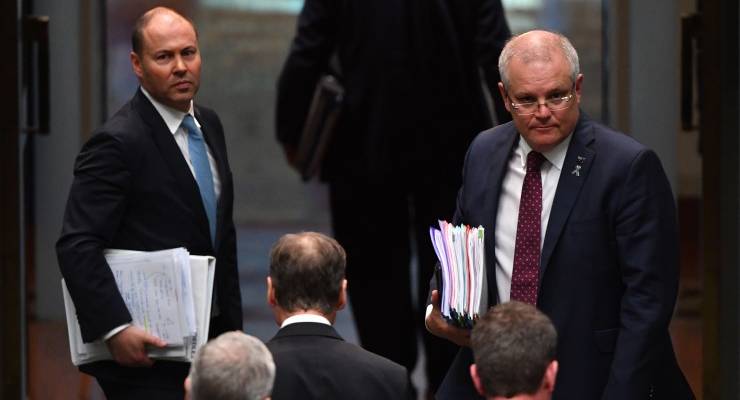
Treasurer Josh Frydenberg was everywhere on the weekend, with a flurry of media appearances to spruik this week’s federal budget. This budget will be a critical one (isn’t it always?) — a chance for Frydenberg to map out Australia’s recovery from the COVID-19 pandemic. Depending on when Scott Morrison chooses to go to the polls, it could well be the last budget before an election.
A look at the rhetoric from the Coalition so far tells a key story of what this budget means: the government is trying to strike a balance between optimism about the recovery and its own impulse to pursue a surplus. It has left Labor with little wriggle-room.
What’s Frydenberg said?
One of Frydenberg’s first big statements of intent in a speech last month was to rule out any “pivots to austerity”. It was quite an admission from a treasurer open about his adoration for Thatcher and Reagan, a sign that big-spending measures like JobKeeper, which went against everything the Liberal Party traditionally stood for, have worked.
Last week Frydenberg tried to walk away a little from being Father Christmas, warning voters not to expect a “spendathon”. Still, there’s a lot of generosity being flagged. The government has pushed record spending on aged care and mental health, funding for child care and women’s health.
Suddenly, the days of Joe Hockey puffing a cigar before delivering a series of savage cuts to pretty much everything seem a long time ago.
What’s the go with the borders?
The lead-up to this year’s budget has felt oddly subdued. Until the weekend, the government’s pre-budget drops were failing to cut through, overshadowed by anger over the India travel ban and vaccine rollout.
The border question continues to hang over this year’s budget, with the government struggling over the weekend to get its messaging right. Morrison said in a weekend media interview that the government would be pursuing a “fortress Australia” strategy of keeping borders closed until COVID-19 was eliminated.
Except he didn’t say that (or mean to say it): in a Facebook post soon after publication, Morrison claimed he was misquoted, and that elimination wasn’t on the cards. That forced Frydenberg to tell Nine papers yesterday that borders would open next year, a key assumption underpinning tomorrow’s budget.
Just seven months ago, the government’s budget assumptions were that borders would be opening this year, and a steady entry of migrants and international students would be beginning in the next few months. Tomorrow, it might pay to be a bit wary of big assumptions about the future of our borders during the pandemic, especially given the political pressure to keep them closed and eliminate risk.
Where does Labor go?
All the rhetoric about big spending has left Labor in a tough place, forced to attack a budget filled with measures they’d traditionally support. So far, the opposition has tried to focus on the government’s profligacy.
Opposition Leader Anthony Albanese tried to draw attention to the government’s bungling of hotel quarantine and vaccinations, while noting that many of their big road upgrades in NSW had already been announced.
Shadow treasurer and media darling Jim Chalmers has repeatedly called the Coalition “the government of sports rorts and dodgy land-deals”, both on Insiders and on at a doorstop this morning.
He spent a lot of time looking back, calling out the government for its wastefulness and failure to deliver a surplus over the last seven budgets. But the pandemic erases all of those. It’s tomorrow that counts.








‘The pandemic erases all of that’.
No, it shouldn’t, but journalists ensure it does because of horse-race journalism.
Why can’t Labor just quote the Coalition, in how they reacted to Labor’s handling of the GFC – pointedly pointing out the cant politics of Scotty FM, his treasurer and all – attempting to buy votes for another three years of their self-indulgence on the public teat; record on “aged care”, “health”, welfare, tertiary education etc etc?
Their record in office?
Well that was a wasted five minutes. Nothing written here tells me anything not already known.
Where does Labor go? Assuming people would be happy with a LNP budget, as that is what counts most to Australians lives and outlook, is money and material wealth?
If able to access media (organic content not just paid ads), Labor could promote policies round supporting the public sector (as most voters do), super/pensions/retirees, renewable energy sources, carbon emissions, media diversity, gender, immigration and citizenship rights, ageing, public procurement (defence), ethics in public life, maintaining regional/rural communities etc.
With restricted media access precluding messaging for word of mouth Labor really needs go local, grass roots and social media.
“It’s tomorrow that counts…” but I count many pasts, many yesterday’s when this rotten government of inadequates and defectives failed to do basic planning, duty, assessing. I’ll make every effort to denounce them, punish them, lead others to see the faults and gaps, so that an alternative is produced with better, open discussion. Out with the hollow egos and vanities.